|
|
|
Sort Order |
|
|
|
Items / Page
|
|
|
|
|
|
|
| Srl | Item |
| 1 |
ID:
084648
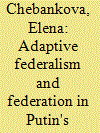

|
|
|
| 2 |
ID:
152606


|
|
|
|
|
| Summary/Abstract |
The very essence of Ambedkar’s vision of social justice was to establish a just, equitable and fair society, where the women, scheduled castes and scheduled tribes would get their due place in the society and for that he did incorporate the provisions in the Indian Constitution so that they would get adequate opportunities so that they could be freed from the then prevalent social evils and ill-practices in the society. As an ardent champion of the cause, he sacrificed his whole life for the amelioration of the conditions of such people in the Indian society. Therefore, he is even hailed today as the messiah of the oppressed and downtrodden.
|
|
|
|
|
|
|
|
|
|
|
|
|
|
|
|
| 3 |
ID:
023186
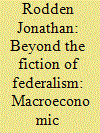

|
|
|
|
|
| Publication |
July 2002.
|
| Description |
494-531
|
|
|
|
|
|
|
|
|
|
|
|
|
|
|
|
| 4 |
ID:
080325
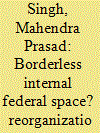

|
|
|
| 5 |
ID:
113200
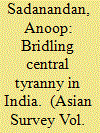

|
|
|
|
|
| Publication |
2012.
|
| Summary/Abstract |
Successive national governments in India have invoked an emergency constitutional provision to impose direct central rule in states over 100 times since 1950. However, such central government usurpation of state governance has declined since the mid- 1990s. This essay demonstrates how India's regional parties, by entering into opportunistic alliances with national parties and joining coalition central governments, have become effective barriers against central dominance. It also identifies the specific dynamics through which this effective veto power is exercised.
|
|
|
|
|
|
|
|
|
|
|
|
|
|
|
|
| 6 |
ID:
051470
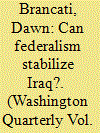

|
|
|
| 7 |
ID:
139397


|
|
|
|
|
| Summary/Abstract |
This article sheds light on the complexity of international climate change negotiations in a federal country, like Canada, where there is no clear attribution of full power over international negotiation concerning this issue. Climate change is a multi-level and multi-stakeholder issue, one that can only be tackled successfully if all actors, at all levels of government, are involved in the process. In recent years, Canadian provinces, especially Québec, have become intensely involved in climate change paradiplomacy. That situation has led to a Canadian paradox where the Government of Québec worked to respect the Kyoto Protocol and act accordingly, while Canada opted out of the Protocol in 2011.
|
|
|
|
|
|
|
|
|
|
|
|
|
|
|
|
| 8 |
ID:
161613
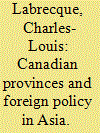

|
|
|
|
|
| Summary/Abstract |
Non-central governments in Canada have become increasingly active on the world stage, most notably in the Asia Pacific region. The scholarly works on Canada’s foreign policy in Asia tend to focus either on the federal government as the main actor, or on the “other diplomacies” of non-governmental actors; little attention has been paid to the increasing role of non-central governments in Asia. This article, therefore, contributes to the discussion by documenting and evaluating Canadian provinces’ international activities in the Asia Pacific. It also situates these activities within Canada’s foreign policy in the region, and assesses how important provinces have become in Canada–Asia relations. This paper first reviews the literature on non-central governments and foreign policy to expose the key forces pushing and pulling Canadian provinces to be increasingly active internationally. It then details the provinces’ international activities in Asia, and locates them within Canada’s foreign policy in the region.
|
|
|
|
|
|
|
|
|
|
|
|
|
|
|
|
| 9 |
ID:
124723
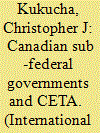

|
|
|
|
|
| Publication |
2013.
|
| Summary/Abstract |
Canadian provinces and territories have gained increasing relevance in matters of international trade over the last several decades. The possibility of a Canada-European Union Comprehensive Economic and Trade Agreement, however, marks the first time that sub-federal governments in Canada have been directly involved in specific areas of negotiations. The significance of this development, examined in this series of policy papers, can be organized under five overarching themes: 1) the negotiation, ratification, and implementation of foreign trade agreements; 2) the need to distinguish between process activity and actual policy outcomes; 3) the ongoing relevance of Canadian federalism; 4) the impact of non-governmental actors, especially civil society; and 5) the differing interpretations of academics, practitioners, business, and societal groups.
|
|
|
|
|
|
|
|
|
|
|
|
|
|
|
|
| 10 |
ID:
152502
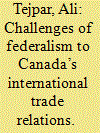

|
|
|
|
|
| Summary/Abstract |
As one of the first “second-generation” free trade agreements that address indirect and non-tariff barriers, the Canada–European Union Comprehensive Economic and Trade Agreement (CETA) is likely to serve as an international model. CETA, however, highlights significant challenges for Canadian federalism in both the negotiation and implementation processes of this and any such future trade agreements. While the inclusion of sub-federal governments allows for provinces/territories to help shape the provisions that fall within their jurisdictions, this paper argues that subsequent challenges arise in conveying a unified Canadian commitment to implement the agreement. Overall, the CETA negotiations demonstrated the significant institutional weaknesses of current federal–provincial/territorial relations with respect to international trade agreements. In the Canadian context, this suggests a need for “summit federalism” to ensure that all federal–provincial/territorial governments align their terms and interests and convey a unified commitment to fulfilling Canada’s current and future international trade agreements.
|
|
|
|
|
|
|
|
|
|
|
|
|
|
|
|
| 11 |
ID:
144752
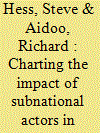

|
|
|
|
|
| Summary/Abstract |
This article discusses the efforts of a Chinese subnational government, Guangxi Province’s Shanglin County, to support local residents as they participated in galamsey, a local reference for unregistered artisanal gold mining in Ghana. This resulted in a diplomatic crisis that complicated Sino–Ghanaian relations and threatened Beijing’s efforts to access Ghana’s energy resources.
|
|
|
|
|
|
|
|
|
|
|
|
|
|
|
|
| 12 |
ID:
139619
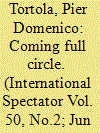

|
|
|
|
|
| Summary/Abstract |
Europe’s woes mark a new chapter in the longstanding theory/history nexus in European studies. The euro crisis has brought integration theory back onto the scholarly agenda and highlighted the value of neo-functionalism – and more precisely its key ‘spillover’ mechanism – as a framework for interpreting current politico-institutional dynamics in the European Union. We are, however, at a particular point of the neo-functionalist narration, in which the transition from low to high political integration has opened a phase of political fluidity that makes ideas and political leadership crucial in determining the future course of integration. In this phase, the positive scheme of neo-functionalism and the normative one of federalism come together, bringing the intellectual trajectory begun after WWII to full circle. Whether this new encounter will result in further integration depends primarily on the content of new federalist ideas, the emergence of an effective European leadership, and the presence of a favourable international environment. For all three factors, the record so far has been mixed at best.
|
|
|
|
|
|
|
|
|
|
|
|
|
|
|
|
| 13 |
ID:
095081


|
|
|
|
|
| Publication |
2010.
|
| Summary/Abstract |
The 1978 Spanish Constitution enshrined the recognition of linguistic, cultural, and some degree of 'national' pluralism in the country and outlined procedural mechanisms for the creation of regional 'autonomies', which has given rise to a de facto asymmetrical federal state. This article begins by analyzing the compromise over issues of national identity embedded in the Constitution and the process by which this was forged. It highlights the articulation among political forces of contending conceptions of national identity and different projects for reorganising the territorial structure within and/or against the Spanish state. It also describes the social bases of support for the respective projects. Next, the article examines recent challenges to the parameters of the constitutional compromise. It shows that citizens' support for the basic parameters of the 1978 compromise remains high and has even become stronger. It emphasises that the preferences of the general public stand in sharp contrast with the preferences of influential sections of the Basque and Catalan regional political establishment, and it concludes that current challenges to the constitutional compromise are driven by political elites.
|
|
|
|
|
|
|
|
|
|
|
|
|
|
|
|
| 14 |
ID:
083647
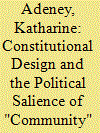

|
|
|
|
|
| Publication |
2008.
|
| Summary/Abstract |
After the defeat of the Taliban, Afghanistan entered a period of constitutional flux. The 2004 Constitution rejected formal ethnic representation in state institutions. This Constitution, therefore, provides no defense against perceived or actual domination of the state by any one particular ethnic community. This could lead to increased ethnic resentment and conflicts.
|
|
|
|
|
|
|
|
|
|
|
|
|
|
|
|
| 15 |
ID:
132772
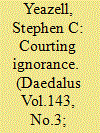

|
|
|
|
|
| Publication |
2014.
|
| Summary/Abstract |
Most of the United States' judicial work takes place in the country's state trial courts. These tribunals preside over everything from traffic tickets to murder trials, from routine debt collection to massive environmental torts. Given their expansive role, the manner in which these courts function is of immense significance. But ultimately, we know very little about these institutions. Our ignorance flows both from trivial bureaucratic turf battles and from deeply rooted principles of local government, a phenomenon I have called "data federalism." In the last few decades, we have begun to form a partial image of the activities of these organs of government; but we know almost nothing about their past, and the little we do know suggests the dangers of extrapolation. This essay explores the extent of our ignorance of state trial courts and the difficulties of overcoming it.
|
|
|
|
|
|
|
|
|
|
|
|
|
|
|
|
| 16 |
ID:
077865
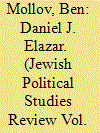

|
|
|
|
|
| Publication |
2007.
|
| Summary/Abstract |
explanatory element in the Jewish political tradition-as the basis of federalism. In his view, brit as the foundation of federalism essentially concerns interaction and relationships. Elazar's approach to federalism has possible applications to contemporary schisms in Israeli society
|
|
|
|
|
|
|
|
|
|
|
|
|
|
|
|
| 17 |
ID:
060283
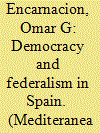

|
|
|
| 18 |
ID:
188820
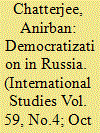

|
|
|
|
|
| Summary/Abstract |
Russia being the largest successor state among the post-Soviet countries, its distinct civilization, unique history, and contribution to various fields has earned interest among scholars. Moreover, it was also perceived that since Russia straddles two continents, Asia and Europe, any development in Russia will either have a direct or an indirect bearing on Europe and Asia. These factors have collectively generated a great amount of scholarly interest in studying post-Soviet Russian democratization. The article focuses on the aspects of the convergence and divergence of these entities in the case of the Russian Federation. In this endeavour, the article chalks out the key components of democratization and their interplay in Russia. An attempt is made to understand the perception of democracy among Russians and whether democratic reforms in post-Soviet Russia led to any change of perception among Russians about democracy. The article also unravels the institutional dynamics in order to ascertain the Russian experience of democratization. The article concludes with some recommendations for future course of actions with regard to democratization.
|
|
|
|
|
|
|
|
|
|
|
|
|
|
|
|
| 19 |
ID:
152500


|
|
|
|
|
| Summary/Abstract |
Trade adjustment assistance (TAA) is government aid to those affected by trade agreements. We review the history of TAA in Canada and ask whether Canada needs to reintroduce it in response to the recent intensification of trade negotiations. In light of the compensation offered by the federal government in connection with the Canada–European Union Comprehensive Economic and Trade Agreement (CETA), we examine how TAA fits in with the evolution of Canadian federalism in the trade policy area. Based in part on interviews with provincial trade negotiators, we conclude, first, that the compensation is an outcome of Canadian federalism. Second, we argue that while there is no reason to reintroduce a federal TAA program for workers, compensation for provinces is necessary to facilitate their cooperation with the implementation of trade treaty provisions. Third, we suggest that a more transparent rationale for such compensation would be superior to the ad hoc compensation observed in CETA.
|
|
|
|
|
|
|
|
|
|
|
|
|
|
|
|
| 20 |
ID:
169513
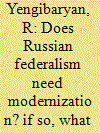

|
|
|
|
|
| Summary/Abstract |
THE WORLD is paying close and steadily growing attention to history, politics and practice of federalism, Russia being no exception. The subject has been covered in hundreds of books and thousands of articles; it was discussed at numerous scientific conferences and seminars yet the interest in it is not subsiding. It is increasing because federalism, its role and place in the contemporary world is gaining importance. Despite the serious and obvious achievements of the scientific theory of federalism it has not yet adequately expressed the essence and the far from simple and, in fact, contradictory nature of this phenomenon, hence new concepts and new doctrines.
|
|
|
|
|
|
|
|
|
|
|
|
|
|
|
|
|
|
|
|
|